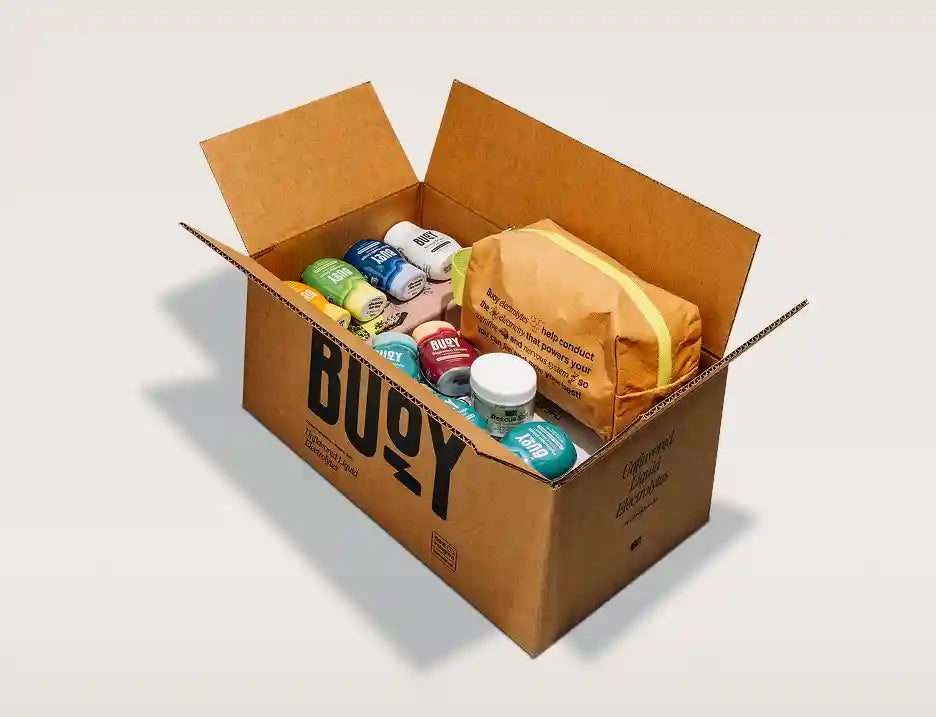
Best Drinks That Help with Bloating And Why They Work
Share
Bloating - that uncomfortable, swollen feeling after a meal - can derail your day. The good news? The right drink can speed relief, ease discomfort, and even prevent bloating from starting. In this guide, you’ll explore the most effective drinks that help with bloating, rooted in herbal tradition and modern science, and discover why pairing them with Digestion Drops delivers next-level, gut-friendly support.
Imagine that post-lunch heaviness melting away as you sip a warm mug of ginger tea, or the subtle uplift you feel combining kombucha with Digestion Drops afterward. That’s the power of a thoughtful hydration strategy - one that aligns with your body’s needs, supports digestion naturally, and fits easily into your routine. These solutions go beyond “just more water.” They’re curated to help your digestive system work smarter and more efficiently, with ingredients that promote movement, reduce gas, and restore comfort.
Essential Takeaways
- Key drinks like herbal teas, fermented beverages, and natural diuretics are some of the most effective drinks that help with bloating.
- Digestion Drops enhance every sip - clean, sugar-free botanical support that targets bloating with enzymes and plant-based actives.
- Smart sipping habits - like warming herbal teas before meals or alternating kombucha with water - help you stay gut-happy all day.
It doesn’t stop there - this guide equips you with drinks you can enjoy throughout the day, plus practical tips for sipping with intention, not just habit. With these tools, your next meal won’t leave you guessing how to get comfortable again.
- Why Targeting “Drinks That Help With Bloating” Matters
- Best Drinks That Help with Bloating
- What to Avoid in Drinks When Managing Bloating
- How Digestion Drops Enhance Drinks That Help With Bloating
- How to Build a Daily Anti-Bloating Beverage Routine
Why Targeting “Drinks That Help With Bloating” Matters
Bloating isn’t just uncomfortable. It messes with your mood, energy, and focus. While gas, fluid retention, or slow digestion are common causes, the remedy doesn’t have to be complicated. Clinical evidence shows that certain drinks speed up gastric emptying, relax tense digestive muscles, and reduce gas buildup. Herbal teas such as peppermint, fennel, and ginger are especially well studied¹². Fermented beverages packed with probiotics further improve gut balance and reduce bloating in trials on IBS and related digestive discomfort³.
Adopting this filter of “drinks that help with bloating” empowers you to choose more wisely - and act faster. Instead of waiting for discomfort to disappear, you can address the cause proactively. With Digestion Drops, you multiply that relief, layering in clean enzyme support and natural carminative herbs - without sugars or colors that might worsen bloating.
This isn't just about relief - it’s about preempting the next bloating episode. When you consistently reach for beverages designed to soothe and resolve, bloating becomes less of a guessing game and more of a minor bump that passes quickly.
Best Drinks That Help with Bloating
1. Ginger Tea
Ginger tea helps food move smoothly through the digestive tract. Its active compounds like gingerol and shogaol have been shown to stimulate digestion, reduce gas, and relax the intestines. A warm cup before or after meals helps reduce bloating and support efficient nutrient breakdown¹⁵.
2. Peppermint Tea
Menthol, the active ingredient in peppermint, helps relax gastrointestinal muscles. It’s particularly effective at easing gas, spasms, and bloating related to IBS. Peppermint tea is best sipped warm and slowly to enhance its soothing effects¹.
3. Fennel Tea
Fennel seeds contain compounds like anethole that help relax the gastrointestinal tract and reduce gas buildup. Fennel tea is especially effective after meals and is a traditional remedy for bloating in Ayurvedic and Mediterranean cultures¹⁶. It’s a gentle option for easing discomfort without disrupting digestion.
4. Kombucha
This fermented tea is rich in probiotics, which can help restore the balance of gut bacteria. A well-balanced microbiome reduces gas production and helps food move through the gut more efficiently³. Choose unflavored, low-sugar options and consider combining it with Digestion Drops for a sugar-free enzyme boost.
5. Lemon Water with a Pinch of Sea Salt
While simple, lemon water stimulates digestive enzymes and helps maintain bile production, both key to smoother digestion. Adding a pinch of mineral-rich salt provides electrolytes and supports better hydration, which can prevent constipation-related bloating².
6. Warm Water with Apple Cider Vinegar
Diluted apple cider vinegar (ACV) before meals may help increase stomach acid and support digestion - especially for people with low stomach acid. Just a tablespoon in 8 oz of warm water, sipped slowly, can reduce gas and bloating for some individuals⁷.
7. Pineapple Juice (In Moderation)
Fresh pineapple contains bromelain, a natural digestive enzyme that can help break down proteins and reduce bloating. Choose unsweetened varieties and stick to small portions, as the natural sugar content can sometimes backfire if consumed excessively⁵.
Each of these beverages offers its own set of benefits, but they work best when consumed thoughtfully - paired with meals, used to wind down after eating, or alternated with water throughout the day. Combining them with Digestion Drops enhances their impact, thanks to targeted plant extracts that support the breakdown of food and ease discomfort quickly.
What to Avoid in Drinks When Managing Bloating
If you’re focused on drinks that help with bloating, you also need to know what to steer clear of. Some beverages that seem healthy can worsen symptoms.
High-Sugar Smoothies and Juices
Even natural sugar from fruit can ferment in the gut and cause gas, especially in large quantities. Avoid smoothies with added protein powders, dairy, or artificial sweeteners - all common bloating triggers.
Carbonated Drinks
That satisfying fizz comes with a downside: bubbles expand in your stomach and trap gas. Regular or diet sodas, sparkling waters, and even kombucha (if overly fizzy) can make bloating worse⁸.
Dairy-Based Beverages
Even those who aren’t lactose intolerant may find that milk-based drinks lead to gas and bloating due to the lactose and protein structures. Plant-based milks like almond or oat can be easier on digestion, but check for gums and additives.
Being mindful of what not to drink is just as important as what you do drink. Creating a gut-friendly beverage routine means minimizing hidden triggers while doubling down on functional, gentle drinks. With Digestion Drops, you simplify this process: one squeeze turns any belly-soothing tea or hydrating water into an active digestive aid.
How Digestion Drops Enhance Drinks That Help With Bloating

Digestion Drops are crafted to work in harmony with the best drinks for bloating. Their formulation includes natural digestive enzymes and carminative herbs like ginger, peppermint, and fennel - all known for reducing gas and easing discomfort.
Because they’re sugar-free, unflavored, and portable, you can add them to nearly any drink, anytime bloating threatens. Whether stirred into warm herbal tea, mixed into kombucha, or added to a lemon-water tonic, Digestion Drops enhance the digestive benefits without altering taste or adding irritants.
They’re also easy to dose -just a short squeeze per drink - so you can customize how much support you need. For heavy meals or known triggers, add an extra squeeze. For daily prevention, one serving in your morning tea or water bottle goes a long way.
This isn’t a band-aid. It’s daily digestive care with convenience built in.
How to Build a Daily Anti-Bloating Beverage Routine
If bloating shows up frequently, consistency is your best tool. Here's how to create a beverage lineup that works all day long:
-
Morning: Start with warm lemon water and sea salt or a ginger-infused tea. Add Digestion Drops to both to kickstart your digestion.
-
Midday: Alternate sips of water with herbal teas like fennel or peppermint. If you enjoy kombucha, have it before or with lunch, not afterward.
-
Afternoon: Choose green tea or diluted ACV in warm water. These help maintain digestive momentum and reduce afternoon bloat.
- Evening: Unwind with a caffeine-free herbal blend like chamomile or fennel. Add Digestion Drops if dinner was heavy or late.
Building these rituals into your day helps your digestive system stay regulated, responsive, and less reactive to triggers.
Bloating is frustrating, but it's also manageable - especially when your hydration supports your digestive function. From ginger tea to kombucha, choosing drinks that help with bloating gives your body the support it needs to move food efficiently, reduce gas, and avoid discomfort.
Pairing those drinks with Digestion Drops supercharges the impact. With clean, targeted ingredients and no added sugars or flavors, they blend seamlessly into any beverage and elevate your anti-bloating routine.
Stay consistent, sip smartly, and let your hydration work for your gut. Not against it.
References:
-
McKay, D. L., & Blumberg, J. B. (2006). A review of the bioactivity and potential health benefits of peppermint tea. Phytotherapy Research, 20(8), 619–633.
-
Maughan, R. J., & Shirreffs, S. M. (2010). Hydration and performance during exercise. Nutrition Bulletin, 35(1), 7–13.
-
Staudacher, H. M., Whelan, K., et al. (2017). Fermented foods, the gut microbiome, and IBS: A systematic review. Alimentary Pharmacology & Therapeutics, 45(4), 501–514.
-
Shamsuddin, S. A., et al. (2018). Herbal treatments for digestive disorders: A systematic review. Complementary Therapies in Medicine, 36, 49–57.
-
Maurer, H. R. (2001). Bromelain: Biochemistry, pharmacology, and medical use. Cellular and Molecular Life Sciences, 58(9), 1234–1245.
-
Di Ciaula, A., & Portincasa, P. (2012). The role of diet in bile production and gallbladder function. Current Medicinal Chemistry, 19(21), 3751–3758.
-
Martinsen, T. C., et al. (2005). The role of acid and bile in gastroesophageal reflux disease. Digestive Diseases, 23(1), 1–9.
- Suarez, F. L., & Levitt, M. D. (1995). Review article: The role of intestinal gas in bloating and flatulence. Alimentary Pharmacology & Therapeutics, 9(1), 85–94.




